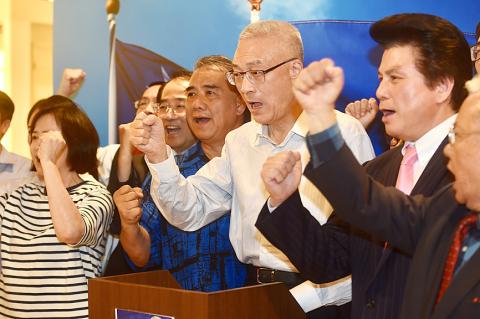Former vice president Wu Den-yih (吳敦義) yesterday became the new Chinese Nationalist Party (KMT) chairman after securing more than 140,000 votes of the 272,682 cast in the election.
The KMT announced that Wu had garnered 144,408 votes, representing 52.24 percent of those cast, to win the six-way election.
Wu is to assume the position on Aug. 20 for a term of four years.

Photo: Chien Jung-fong, Taipei Times
Outgoing KMT Chairwoman Hung Hsiu-chu (洪秀柱), the runner-up, obtained 53,063 votes, followed by former KMT vice chairman Hau Lung-bin (郝龍斌) with 44,301 votes.
Former KMT vice chairman Steve Chan (詹啟賢) had 12,332 votes, while former Taipei Agricultural Products Marketing Corp (台北農產公司) general manager Han Kuo-yu (韓國瑜) and former KMT legislator Pan Wei-kang (潘維剛) obtained 16,141 votes and 2,437 votes respectively.
KMT headquarters said that voter turnout was 58.03 percent — a 1.71 percent increase compared with last year’s KMT chairperson election, which had a turnout of 56.34 percent, the lowest in the party’s history.
Yesterday’s election saw the lowest-ever voter turnout among 12,724 KMT members living overseas, with only 5,127 voting.
The party has a total of 476,147 members.
Hung led Wu in the overseas vote by a razor-thin margin by winning 2,323 votes, compared with Wu’s 2,069 votes, while Hau trailed in third with 409 votes.
Hau last night issued a statement conceding defeat and saying that he hopes the KMT would promote harmony among its members and that the party has a prosperous future.
Hung also conceded defeat last night, calling on party members to unit behind the new party chairman.
On Facebook, Chan issued a statement saying that “the members have voted” and that he would like to wish the party “all the best.”
Chan hinted that he is preparing his next career move in the KMT, saying that he would “see his supporters soon.”
Han thanked his supporters, and said that he had not fought hard enough in the campaign.
According to the KMT’s charter, if no single candidate obtains 50 percent of the votes, a run-off election would have to be held between the top two candidates. Democratic Progressive Party (DPP) spokesman Chang Chih-hao (張志豪) congratulated Wu on behalf of the DPP, saying that the party hopes Wu would adopt a nonpartisan stance in his endeavors to help the nation bring about reform.
After his win, Wu declared in a speech that the KMT would adhere to the “1992 consensus” if it wins the 2020 national elections.
The “1992 consensus” refers to a supposed understanding reached during the cross-strait talks in 1992 that Beijing and the Chinese Nationalist Party acknowledge that there is “one China,” with each side having its own interpretation of what that means.
In 2006, former Mainland Affairs Council chairman Su Chi (蘇起) admitted he made up the term “1992 consensus” in 2000, before the KMT handed power to the Democratic Progressive Party.

SECURITY: As China is ‘reshaping’ Hong Kong’s population, Taiwan must raise the eligibility threshold for applications from Hong Kongers, Chiu Chui-cheng said When Hong Kong and Macau citizens apply for residency in Taiwan, it would be under a new category that includes a “national security observation period,” Mainland Affairs Council (MAC) Minister Chiu Chui-cheng (邱垂正) said yesterday. President William Lai (賴清德) on March 13 announced 17 strategies to counter China’s aggression toward Taiwan, including incorporating national security considerations into the review process for residency applications from Hong Kong and Macau citizens. The situation in Hong Kong is constantly changing, Chiu said to media yesterday on the sidelines of the Taipei Technology Run hosted by the Taipei Neihu Technology Park Development Association. With

CARROT AND STICK: While unrelenting in its military threats, China attracted nearly 40,000 Taiwanese to over 400 business events last year Nearly 40,000 Taiwanese last year joined industry events in China, such as conferences and trade fairs, supported by the Chinese government, a study showed yesterday, as Beijing ramps up a charm offensive toward Taipei alongside military pressure. China has long taken a carrot-and-stick approach to Taiwan, threatening it with the prospect of military action while reaching out to those it believes are amenable to Beijing’s point of view. Taiwanese security officials are wary of what they see as Beijing’s influence campaigns to sway public opinion after Taipei and Beijing gradually resumed travel links halted by the COVID-19 pandemic, but the scale of

A US Marine Corps regiment equipped with Naval Strike Missiles (NSM) is set to participate in the upcoming Balikatan 25 exercise in the Luzon Strait, marking the system’s first-ever deployment in the Philippines. US and Philippine officials have separately confirmed that the Navy Marine Expeditionary Ship Interdiction System (NMESIS) — the mobile launch platform for the Naval Strike Missile — would take part in the joint exercise. The missiles are being deployed to “a strategic first island chain chokepoint” in the waters between Taiwan proper and the Philippines, US-based Naval News reported. “The Luzon Strait and Bashi Channel represent a critical access

Pope Francis is be laid to rest on Saturday after lying in state for three days in St Peter’s Basilica, where the faithful are expected to flock to pay their respects to history’s first Latin American pontiff. The cardinals met yesterday in the Vatican’s synod hall to chart the next steps before a conclave begins to choose Francis’ successor, as condolences poured in from around the world. According to current norms, the conclave must begin between May 5 and 10. The cardinals set the funeral for Saturday at 10am in St Peter’s Square, to be celebrated by the dean of the College